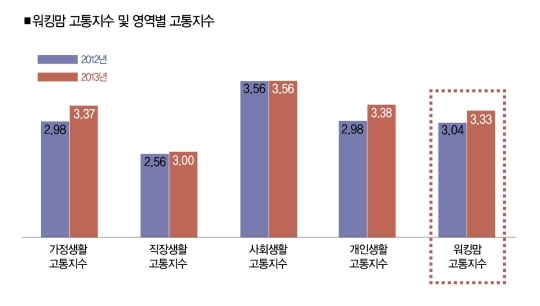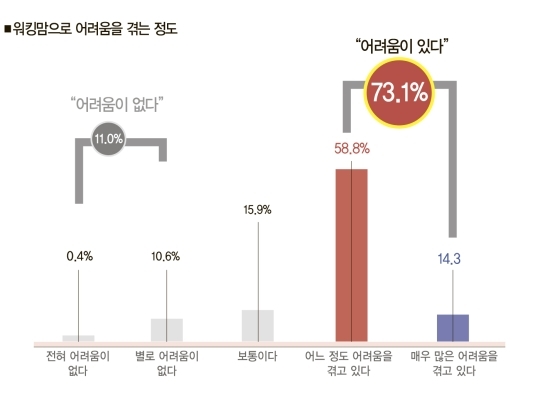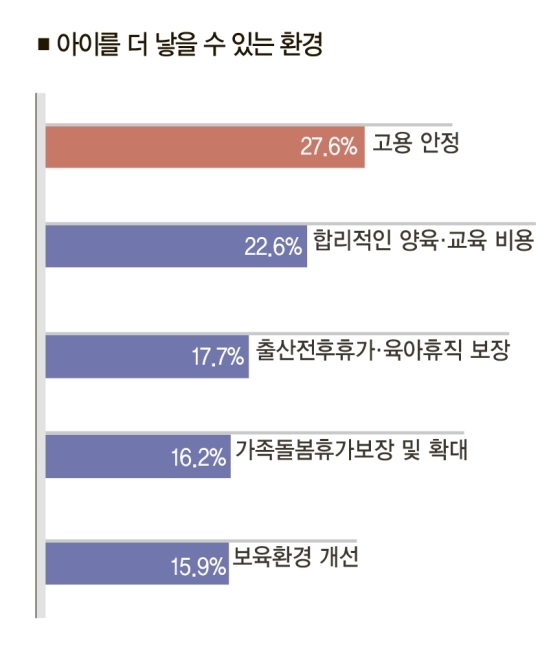0.29 points higher than last year
Working mothers are miserable. Women and Culture In Network calculated the misery index of working mothers based on data from a survey funded by Ministry of Gender Equality and Family. The misery index reached 3.33, 0.29 increase from the previous year’s reading of 3.04. This result shows how work-life balance policies are not helping working mothers. "Misery Index of Workingmoms" quantifies stress level on a scale of zero to five. A reading closer to 5 indicates higher levels of stress and 7 out of 10 respondents said that they are extremely stressed out.
The survey of 1000 working mothers was conducted in September. For the survey, the life of a working mother was divided into four areas: family, work, social, and personal. Working mothers were most stressed by social life (3.56), followed by personal (3.38), family (3.37) and work (3.00).
Generally, mothers in their 30s record higher in overall misery index as well as by each category compared to those in their 40s. Also, Seoul residents in their 30s with youngest child under the age of 5, who work long hours, were found to be experiencing extreme difficulties.

No time to relax after work
In terms of family life, working mothers were suffering the most due to ‘lack of proper rest time’ (3.92 points), which shows that mothers do not have sufficient time to rest due to house chores and childcare. ‘Lack of help in household chores’ (3.87), ‘lack of help in childcare’ (3.86), ‘lack of focus on childcare due to work’ (3.60) and ‘lack of focus on household chores due to work’ (3.55) were also high on the list. All nine sub-categories of the misery index increased compared to the previous year.
Hard to take time off from work
‘Lack of control over vacation period at work’ (3.40) was at the top of the working life misery index followed by ‘Negative perceptions such as working mothers can’t focus at work’ (3.23), ‘inflexible work schedule’ (3.20) and ‘unable to take time off from work’ (3.03). All nine sub-categories of working life misery index rose compare to last year. Among them, the index for ‘frequent get-together at work’ increased the most (by 0.50) followed by ‘discrimination against working mothers’, ‘unable to take time off from work’ and ‘inflexible work schedule.'
The results show that working mothers desperately want more control over their vacation period and work schedule for sick children and family events.
Loopholes in work-life balance policies
For social life, working mothers were mostly stressed due to ‘lack of policies for working women’ (4.09 points) followed by ‘work-life balance problems’ (4.03), ‘challenges to participation in community events’ (3.78), ‘lack of service for daily needs’ (3.75) and ‘lack of information for child-related matters’ (3.67). This reveals the loopholes in work-life balance policies.
Compare to last year’s misery index, this year’s numbers generally stayed the same. However, the misery index for other categories such as ‘lack of generalization of service for working mothers’ (-0.20), and ‘insufficient government subsidies to boost childbirth’ (-0.13) decreased a little. Among the social life sub-categories, the index of ‘social behavior of a child’ (0.25) saw the biggest increase compared to the previous year.

Physically worn out
‘Physically worn out’ (3.94) was at the top of personal life misery index followed by ‘Insufficient increase in household income (3.69), ‘Prioritization between child and career’ (3.63), ‘Lack of satisfaction in balancing work and family’ (3.27), and ‘Pressure related to child’s education’ (2.95). The index generally stayed the same from the previous year except for ‘Lack of satisfaction in balancing work and family’ (0.30) and ‘Pressure related to child’s education’ (0.26), which increased the most.

Employment security can increase birth rates
When it comes to boosting birth rate, working mothers chose ‘employment security’ as the most important factor followed by ‘reasonable cost for education and child rearing’, ‘securing maternity and parental leave,’ and ‘securing and expanding family-care leave’.
Respondents who chose ‘employment security’ were mostly Seoul residents, high school graduates, and part-time workers with average monthly income between 1 million and 1.99 million won. The respondents who chose ‘reasonable cost for education and child rearing’ were in their 30s, obtained at least a Master’s Degree, had more working days than average and full-time workers with average monthly income of more than 4 million won.
Based on results of Misery Index of Workingmoms, Women and Culture In Network will have ‘Working Mom Leadership Education Session’ from October 22 in 6 cities and provinces starting from Ansan-si and Dongdoocheon-si.

